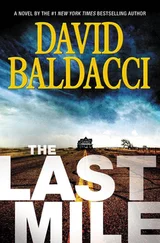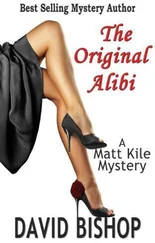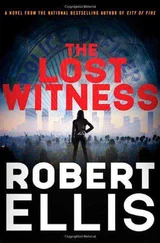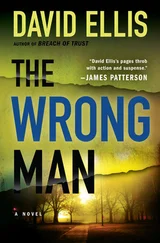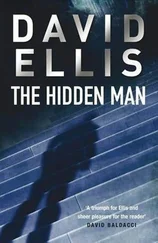David Ellis - The Last Alibi
Здесь есть возможность читать онлайн «David Ellis - The Last Alibi» весь текст электронной книги совершенно бесплатно (целиком полную версию без сокращений). В некоторых случаях можно слушать аудио, скачать через торрент в формате fb2 и присутствует краткое содержание. Год выпуска: 2013, Издательство: Penguin Group US, Жанр: Триллер, на английском языке. Описание произведения, (предисловие) а так же отзывы посетителей доступны на портале библиотеки ЛибКат.
- Название:The Last Alibi
- Автор:
- Издательство:Penguin Group US
- Жанр:
- Год:2013
- ISBN:нет данных
- Рейтинг книги:3 / 5. Голосов: 1
-
Избранное:Добавить в избранное
- Отзывы:
-
Ваша оценка:
- 60
- 1
- 2
- 3
- 4
- 5
The Last Alibi: краткое содержание, описание и аннотация
Предлагаем к чтению аннотацию, описание, краткое содержание или предисловие (зависит от того, что написал сам автор книги «The Last Alibi»). Если вы не нашли необходимую информацию о книге — напишите в комментариях, мы постараемся отыскать её.
The Last Alibi — читать онлайн бесплатно полную книгу (весь текст) целиком
Ниже представлен текст книги, разбитый по страницам. Система сохранения места последней прочитанной страницы, позволяет с удобством читать онлайн бесплатно книгу «The Last Alibi», без необходимости каждый раз заново искать на чём Вы остановились. Поставьте закладку, и сможете в любой момент перейти на страницу, на которой закончили чтение.
Интервал:
Закладка:
“Is there anything you didn’t print?” O’Connor asks.
“If there is, I can’t think of it.”
“And whose prints did you find?”
“We found prints belonging to the defendant and prints belonging to Alexa Himmel.”
“Any others?”
“None that we could match.”
It doesn’t hurt that I have a cleaning lady who comes once a week, a nice Polish girl named Dita, so presumably the place is fairly wiped down at any point in time.
“We checked for the presence of any shoe prints or markings and found nothing other than a shoe that matched the defendant’s, a partial shoe print in the foyer by the garage-access door. Otherwise, no shoe prints.”
“And what about the handgun that fired the bullet that killed Ms. Himmel?”
“We examined the firearm and attempted to extract fingerprints.”
“What was the result, Officer?”
Officer Brannon says, “There were no fingerprints found on that weapon.”
“Is that unusual, in your experience?”
“Not especially. Prints don’t stick on firearms nearly as often as people think.”
“Did you find anything else while examining the firearm?”
“Yes,” she answers. “We found traces of isopropyl alcohol and benzalkonium chloride on the firearm in several places. These are chemicals found, among other places, in your typical disinfectant wipes people keep in their homes.”
“Did you find any such disinfectant wipes in the defendant’s home, Officer?”
“Yes, we found a canister of Clorox disinfectant wipes, fresh scent, on the counter.”
“Did you do any further follow-up?”
“Yes, we did,” says Brannon. “In the garbage can in the defendant’s kitchen, we found a used disinfectant wipe. It was still damp.”
“I see. And what did all of this lead you to conclude?”
Shauna could object. But she won’t. The jury’s thinking it already.
“Before the police recovered that gun, someone had wiped it down with a disinfectant cloth,” says the officer.
“Thank you, Officer. No further questions.”
“Someone. . wiped down the gun. . with a disinfectant cloth,” says Shauna. “Well, let’s talk about the gun, Detective.”
“Officer,” Brannon corrects.
“My mistake. Officer. ” Only I know Shauna well enough to know that her mistake was intentional. “Officer, this handgun was found by the police resting on the floor in my client’s living room, wasn’t it?”
“That’s my understanding, yes.”
“So. . it wasn’t exactly hidden, was it?”
The prosecutor, Katie O’Connor, moves in her chair but doesn’t object. She could. Roger Ogren would, if this were his witness. But O’Connor probably figures that we haven’t been obnoxious with objections, so she won’t be, either.
“Hidden? I wouldn’t call it hidden, no.”
“It was in plain sight, for all to see.”
“That’s my understanding.”
“In fact, the first thing Jason did when the police arrived was tell them about the gun. Isn’t that true?”
“I don’t know that for a fact, but I’d heard that, yes.”
“This was my client’s gun, isn’t that right, Officer?”
“Yes.”
“The serial number on the gun wasn’t scraped off, was it?”
“No, it was not.”
“It was incredibly easy for you to type a number into a database and determine that this gun belonged to Jason.”
“It was, yes.”
“If Jason hadn’t already said so himself.”
The witness doesn’t answer. That’s fine by Shauna.
“So Jason wasn’t trying to hide the presence of the gun or the fact that it was his, was he?”
“As far as I know, no, he wasn’t trying to do that.”
“Would it seem unusual to you that my client might handle his own weapon from time to time?”
Again, O’Connor considers objecting, but she probably thinks that Shauna’s actually helping her, planting an image in the jury’s mind of me holding that gun, being comfortable with it, maybe even playing pretend with it in the mirror, like Robert De Niro in Taxi Driver .
“Would it seem unusual that your client would handle his own weapon from time to time. . No, that wouldn’t be unusual,” the officer answers. “It’s his gun.”
“Exactly. So given that it wouldn’t be suspicious in the least for Jason’s fingerprints to be on a weapon that he’s owned for over a decade, can you think of any possible reason why Jason would wipe down that gun?”
The witness has no answer for that.
It’s a strong point, and the right place to end. If I was the one who shot Alexa, why would I wipe down the gun, when my prints being on the weapon wouldn’t be suspicious in the slightest, and when I knew, as a longtime prosecutor and now defense lawyer, that trace evidence of the disinfectant would be found on the gun?
Why would I do that?
“Officer,” says Katie O’Connor on redirect, “you’ve been on the police force for how long?”
“Six years, five months.”
“And in your experience, do even intelligent criminals sometimes do stupid things?”
“Objection,” says Shauna.
“Sustained.”
“In your experience, do criminals under incredible stress do stupid things?”
“Objection.”
“Sustained.”
“In your experience, would a criminal ‘under the cloud of addiction’ to OxyContin do something stupid?” Using the same phrase Shauna used, mocking her.
“Objection.”
“Sustained. Ms. O’Connor, this line of inquiry is finished,” says Judge Bialek.
“So am I, Judge,” O’Connor says, sitting down with satisfaction.
The point of an adversarial criminal justice system is for each side to put forth their case, and somewhere in the middle, within that tug-and-pull of competing theories, emerges the truth. This is one of those times. They’re both right. Shauna is right that it wouldn’t make sense for me to clean off that gun with a Clorox disinfectant wipe.
And Katie O’Connor is right that I did, in fact, do that very thing.
62
Jason
Court reconvenes after lunch. Roger Ogren stands, flattens his tie, buttons his coat, and says, “The People call Special Agent Dennis Jumer.”
The local cops still bring in the FBI a lot to assist with cell phone technology, most notably tracking the movements of suspects by their cell phone usage. We used this historical cell site analysis on occasion when I was working Gang Crimes at the county attorney, but nowadays they’ve taken this stuff to an art form. There are agents like Jumer who basically do nothing else but check cell phone records and put dots, or circles, on a map.
“I’ve been a special agent with the FBI for almost eleven years,” he tells Ogren. “I’ve been assigned to our Narcotics and Firearms Task Force for the last five.”
“As part of your duties, do you analyze cell phone records?”
“Yes, that’s the largest part of what I do these days. I typically do historical cell site analyses on cell phone records.”
“Why do you conduct historical cell site analyses, Agent Jumer?”
“The purpose is to determine the approximate locations of cell phones at the time the calls were placed that are detailed in the records.”
A cell phone is a radio, and when it’s used it sends out radio frequencies in all directions. It will hit multiple towers belonging to that service provider, and that provider will have a switching channel that will pick which of its towers should provide service to the cell phone. Each tower has its own identifier, and the service provider records that particular tower in its call detail records.
So when you call somebody on a cell, the FBI can go back later and say, at this day and time, you initiated a phone call, and this was the tower that provided service to that phone. The tower providing service is usually the one that’s closest to the cell phone’s location, but not always, especially in an urban area with high call traffic. So it’s not an exact science.
Читать дальшеИнтервал:
Закладка:
Похожие книги на «The Last Alibi»
Представляем Вашему вниманию похожие книги на «The Last Alibi» списком для выбора. Мы отобрали схожую по названию и смыслу литературу в надежде предоставить читателям больше вариантов отыскать новые, интересные, ещё непрочитанные произведения.
Обсуждение, отзывы о книге «The Last Alibi» и просто собственные мнения читателей. Оставьте ваши комментарии, напишите, что Вы думаете о произведении, его смысле или главных героях. Укажите что конкретно понравилось, а что нет, и почему Вы так считаете.

